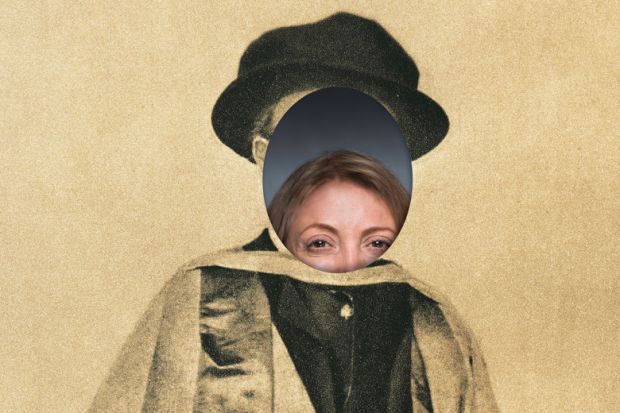The degree-awarding season is upon us again and, as usual, universities are seeking to add a bit of celebrity sparkle to their ceremonies via the award of an honorary degree or two. Or three or four…
Honorary degrees are rarely out of the news, whether for the pomp-filled glory of their award, or the acrimony surrounding their revocation. They are, however, just one corner of a vast global network of honours, courtesies and titles that seems to me to be at odds with 21st-century quality assurance and professional regulation.
In all societies, people love to be honoured, and to do some honouring in return. Through awards, medals, fancy dress, feathers – even a gaudy penis gourd – you are marked out for respect – and, of course, envy. The different domains of society – religious, military, professional, academic, commercial, sporting, journalistic and more – have their distinctive hierarchies of recognition. From time to time, they also spill over from one domain into another, with honorary degrees to football players, or press awards to business people. Sometimes honours come with a position too. Under British rule, the archbishop of Malta was also an honorary major-general in the army, for instance.
Universities’ degrees are key building blocks of civic regard, whether awarded by examination or honoris causa. But universities honour in many other ways as well: through awards (such as fellowships), titles (honorary professorships), research or teaching prizes, and through “laureate” recognition (patrons or chancellors). The most noteworthy practice, however, lies in the “unearned”, honorary award of the highest denomination of a university’s currency, the doctorate.
I first bumped into “unearned” degrees when thinking of applying to an American university as an undergraduate. The generic form commanded me to “list earned degrees only; provide certified proof”. My youthful image of a degree had been a series of subjects you studied, according to some set formula, gaining results that led to the eventual award. So what were the unearned degrees the form had in mind?
Some degrees are, of course, straightforwardly fake. In 2007, a dean at Massachusetts Institute of Technology resigned after admitting that she did not have the qualifications claimed earlier in her career. Even honorary degrees are sometimes falsely claimed. In 2008, the Iranian interior minister Ali Kordan was found to have a fraudulent honorary doctorate of law from the University of Oxford; the supposed testamur even contained spelling and grammatical errors. He was subsequently impeached by the Iranian parliament.
Then there are degrees that are not qualifications. The master’s of arts from Oxford and the University of Cambridge are starring examples. These have no subject, content or assessment. Current and previous prime ministers Theresa May and David Cameron, along with many thousands of others, have gained these spurious degrees through an invitation issued to Oxbridge BA honours graduates of a certain “standing”. For my own MA from Cambridge, all I had to do was live for six years after completing my first undergraduate term in residence. And pay £15. The Quality Assurance Agency repeatedly warns that these MAs are not postgraduate degrees, nor even academic qualifications, but a survey in 2000 showed that 62 per cent of British employers genuinely thought that they were awarded for “postgraduate achievement”. This misunderstanding offers a potential employment advantage for the holder, yet the matter slips by every time it is raised with regulators, the press or in Parliament.
Cambridge, Oxford and Trinity College Dublin are also the most notable group of universities to offer “courtesy” degrees to those who already have a degree from another member of the syndicate. For instance, if you have a PhD from Cambridge and you teach at Oxford, then Oxford might award you its DPhil. This can lead those not in the know to think you have actually studied for two doctorates.
Some degrees awarded for genuine academic achievement are later deemed unearned and are rescinded by the awarding university. Notable here are the plagiarised doctoral theses of a recent president of Hungary, Pál Schmitt, and a defence minister of Germany, Karl-Theodor zu Guttenberg, both of whom resigned their posts when their misdeeds were uncovered. A Romanian prime minister, Victor Ponta, decided, notwithstanding revelations about his own plagiarism, to remain in post (“Doctoral integrity springs a leak along the Danube”, Features, 16 May 2013).
Other degrees are partly earned, through gaining block credit. This occurred, for instance, when bachelor’s degrees were awarded to officers returning from the First World War for just two years of study. It still occurs in some universities through degrees by “affiliation”: with a “good” degree from an “approved” university, you can study for a second bachelor’s degree in just two years, even if the subject is entirely different. I have an affiliated BA degree from Cambridge in music. At that university’s suggestion, I just skipped the second year of the three-year course – with few regrets, I must confess.
At the pinnacle of this considerable unearned pile are honorary degrees – normally now awarded only at doctoral level. These have been awarded across Europe since medieval times, although their early history is a little murky. Oxford reportedly awarded its first one in the 1470s, but the complexity of early universities’ relations with church and state makes it hard to probe further back with much certainty.
Their intention is to bring honour to awarder and awardee alike. They can celebrate any form of life achievement, the holding of a high office or support of the university. Many institutions claim to select honorary doctors as inspirational models for their own students.
In theory, the honorary doctor is not meant to request the award, nor even to be aware of discussion about its prospect. While some universities exclude current staff, students, governors or serving politicians, others have no such qualms. Some hold highly secretive conclaves to elect this academic equivalent of knights of the realm, while others openly canvass the university community for nominations, involving faculty and academic boards in a process that is normally sealed by a confidential committee of the governing body.
It is worth remembering that – often for historical or even founding reasons – some universities do not award honorary degrees. MIT and Stanford and Cornell universities are eminent examples. They may deem honorary degrees to be unhelpful reverberations from a bygone age of privilege that devalue earned degrees, deflect attention from their real educational mission or cloak underspecified philanthropy, influence or intrigue.
Nevertheless, it is in the US and other republics where – since regal, state, professional or religious honours tend to be more limited – the honorary doctorate can take on an added importance. And, in light of that, it is not surprising that the classic text on unearned degrees, Honorary Degrees: A Survey of Their Use and Abuse, was published in 1943 by the American Council on Public Affairs in Washington DC.
Its author, Stephen Edward Epler, then the dean of men at Southern Oregon College of Education, traces such awards from their first reported instance in North America – an honorary STD (doctor of sacred theology) awarded in 1692 to Harvard University’s president, Increase Mather – right through to the Second World War. His survey remains as relevant as it was in 1943, since few circumstances encountered today have not occurred previously.

The early American conferring of honorary degrees was understandable. Believing that “only a doctor can create a doctor”, a new land with only one college needed to start the ball rolling somewhere. So, where better than with Harvard’s president? As new faculties or institutions were created, other academics or experienced professionals gained honorary awards similarly. But there was always a fine line, as Epler points out, between erasing academic “deficiencies” and damaging an institution’s reputation through over-awarding.
Escalating awarding of honorary medical doctorates in the 19th century became professionally counterproductive, and encouraged the development of an independent “licence to practice”. As late as 1909, James E. Powers, president of the Northeastern Dental Association, declared to his annual convention that “the most dangerous, delusive, debauching and degrading thing in American educational life…is the practice of granting unearned degrees”. While the medical professions did eventually cleanse their honorary stables and restore public trust in earned degrees, the legal profession never really managed to reclaim its LLD (doctor of laws).
A similar battle over the reputation of the newfangled doctorate of philosophy (PhD), first awarded in the US in 1861, went on for half a century. Unearned PhDs rapidly proliferated, to such an extent that, during the 1870s, they probably outnumbered earned ones. The very credibility of this new venture into research credentialing was threatened. But, by 1910, the rearguard battle was all but won; the public, too, wanted its PhD to be earned.
The UK benefited from this American experience when the first British PhDs emerged after the First World War. Most universities award them only by submission and assessment. Cambridge, for instance, restricts its honoraries to five time-hallowed “titular” degrees, in divinity, law, science, letters and music.
However, this highlights another growing confusion since all of these are also awarded as “full degrees by submission and assessment of major academic work”. That is, they are higher doctorates. But that’s not all. Take the DMus, for example. As well as being an earned higher and unearned honorary degree, it is also now offered as a practically oriented research degree (for instance, at the Royal College of Music). In many parts of the world, including the largest music school in the US at Indiana University Bloomington, it is a form of professional doctorate achieved by coursework and project. If all else fails, you might even hope for a Lambeth DMus – still occasionally awarded by the Archbishop of Canterbury under the Ecclesiastical Licences Act of 1533 – either through recognition of your prior service, or by examination.
For years I laboured under the innocent misapprehension that a particular Lord Mayor of the City of London was a musician. The plaque commemorating the Queen’s opening of London’s Barbican Centre in 1982 also lists “The Rt Hon the Lord Mayor Sir Christopher Leaver GBE, DMus”. A quarter-century later, as vice-chancellor of City University London, I found myself physically bestowing honorary doctorates upon annually incoming Lord Mayors for their “achievement in reaching the position”. It turns out that Leaver, a wine merchant by trade and without any earned degree, was a keen music lover and supporter. So, in a great year for music in the City, he had opted to take his offered doctorate in music.
It is also the case that some newer British universities do now issue honorary PhD or DPhil degrees honoris causa. Most newsworthy was the award of one to the Dalai Lama by London Metropolitan University in 2008 – although more because of China’s protests than because of the doctoral nomenclature. And perhaps most surprising, given the QAA’s repeated warnings about such non-quality-assured non-qualifications, was the 2010 conferral of an honorary PhD by the University of Gloucestershire upon a former chief executive of the QAA, Peter Williams.
All of this raises three questions to which there is no current consensus of answers: how do you adequately distinguish between unearned and earned degrees? Should honours be granted simply by virtue of attaining an eminent position? And when or where should an honorary doctor be addressed as “doctor”?
If so many employers misunderstand the Oxbridge MA, then the subtle distinctions between same-titled doctorates are lost on virtually everyone. Epler, drawing on American experience, observes occasional attempts to dampen such confusion by building “honorary” into the very title, as in honorary doctorate (HonD, for short). This did not catch on, but a similar intention is behind the honorary “doctor of the university (DUniv)” now awarded by some universities.
In terms of using the title, a fragile protocol exists that it should be confined to within the granting institution. The problem is that a cut‑and-paste age defies such distinctions. Consider Kevin Everett, chair of one of London’s largest educational philanthropies, Sir John Cass’s Foundation. He holds several honorary doctorates from London universities that respect this protocol about title. So he is a Dr at the University of East London, but a Mr at London South Bank University. There are inevitable slip-ups, however: even his own foundation, in describing its joint projects, sometimes uses “institution-only titles”.
Perhaps the most serious case of British honoraryism is Richmond, the American International University in London. Its 14 listed trustees (governors) share between them five earned and 17 unearned doctorates. And six of the latter were bestowed by Richmond itself.
Of course, the real disasters with honorary degrees occur when the cosy mutual compact of honour is ruptured. Suddenly, the charismatic entertainer is revealed to be a pederast, and the entrepreneurial banker a crazed risk-taker; a freedom-fighter is now a murderous dictator, while a brilliant scientist’s research is just a lie. Even the local golf-course developer has become an Islamophobic US president-in-waiting. Then, while you debate revocation, your other honorary alumni start to return their testamurs in disgust and your students ask why you make these ridiculous awards while they work and pay for theirs.
Read next: to honour or not to honour?
I have never respected universities that act with unseemly haste in revoking honorary degrees, in a way they would not dare to do with earned degrees. In the institution’s scramble to save face, the honorary doctor’s right to be held “innocent until proven guilty” can be overlooked. This behaviour, in itself, shows the flummery of such awards.
More impressive was Yale University’s response last year when pressured to withdraw the honorary doctor of humane letters it had just awarded to the Nigerian finance minister, Ngozi Okonjo-Iweala, on the grounds that the Nigerian economy had suffered under her stewardship. “The university has never revoked an honorary degree,” Yale replied. Less impressive was the Vatican’s explanation of why it did not revoke Sir Jimmy Savile’s award of Knight Commander of the Pontifical Equestrian Order of Saint Gregory the Great in the wake of the posthumous revelations about his predatory paedophilia: “There does not exist any permanent official list of persons who have received papal honours in the past, [so] it is not possible to strike anyone off a list that does not exist.”
What to do? Epler came to a crisp conclusion: honorary degrees should go. Despite some benefits, especially in recognition of great academic achievement, they have caused unacceptable confusion, collusion and reputational damage. But Epler was also a realist, and expected such systems to continue, as indeed they do. His concluding words of advice included placing the selection of awardees in the hands of the academic staff, limiting the role of trustees, not rushing the process and making state degree-accrediting agencies play a moderating role over honorary degrees just as they do over earned degrees.
To be in the honorary game, an institution does, of course, need its own stock of honour to bestow. A moment of personal decision befell me when I became vice-chancellor of crisis-torn London Met in 2009, in the wake of revelations that it had been misreporting data on student dropouts for several years. I advised the board of governors to suspend the award of honorary degrees while the university’s own sense of honour was recharged. For the next five years, no honorary degrees were awarded, and no one complained.
Academic institutions are well advised to stick to their core business, and to celebrate their unique values. What starts out as a bit of self-aggrandising, honorary fun can easily lead to genuine loss of honour. For while humans do crave to honour and be honoured, they also gain a perverse pleasure in bringing down yesterday’s heroes.
Malcolm Gillies is a retired vice-chancellor and former columnist for Times Higher Education. He has never accepted an honorary degree.
POSTSCRIPT:
Print headline: Honour bound
Register to continue
Why register?
- Registration is free and only takes a moment
- Once registered, you can read 3 articles a month
- Sign up for our newsletter
Subscribe
Or subscribe for unlimited access to:
- Unlimited access to news, views, insights & reviews
- Digital editions
- Digital access to THE’s university and college rankings analysis
Already registered or a current subscriber? Login






